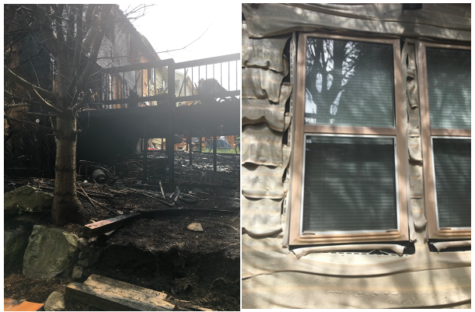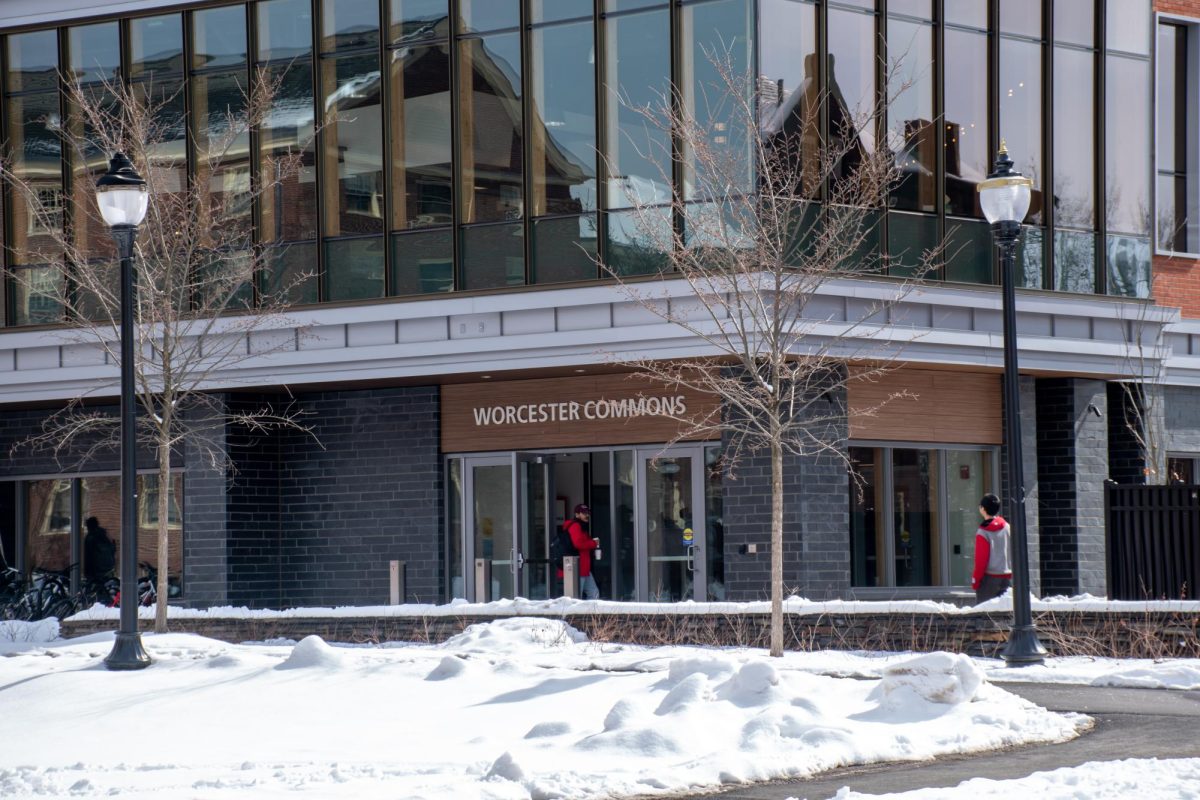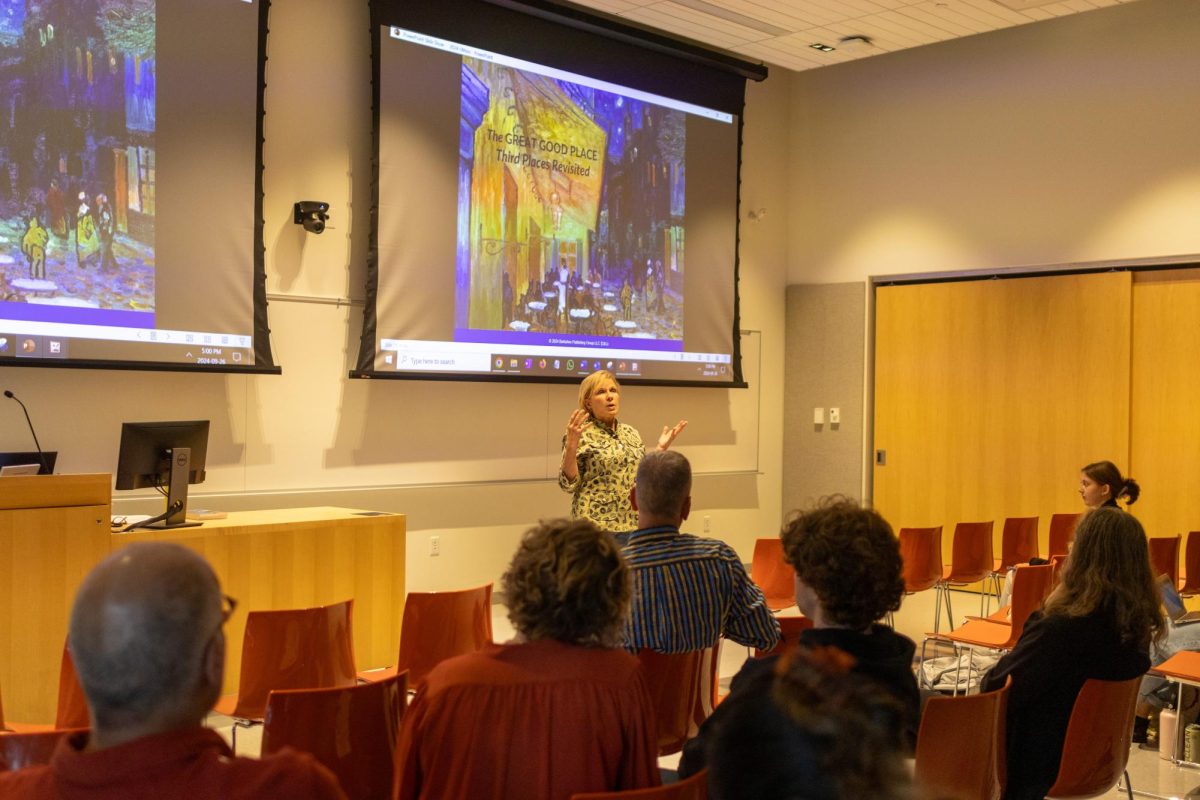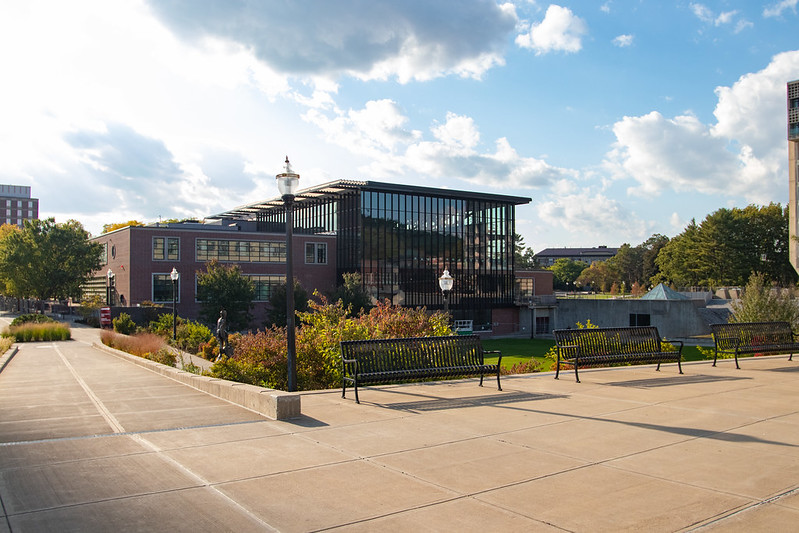At the beginning of the pandemic, biochemistry major Esther Darfour ’21 had to pivot to address the multitude of crises. The first, renewed fighting against racism on the University of Massachusetts campus through a series of emails she sent to the Chancellor at the end of spring 2020. The second, a fire that ripped through the side of her home in the summer. These challenges came on top of the COVID-19 related issues that compounded as she began her last year at UMass.
The emails began alongside nationwide protests of police brutality, and she sent them to Chancellor Subbaswamy until receiving a response in June. She included examples of racism from UMass students – such as a photo of a student from a past year sporting ‘blackface’ – asking the chancellor: “remember UMatter at UMass? I never said that truthfully and here’s another reason why.” In another email to an administrator titled “UMatter?” she described racism as a longstanding issue on campus and emphasized her commitment to fighting it.
“Today, I’ve decided to advocate for my brothers and sisters of UMass, to unveil our injustice that we’ve dealt with for so long. I’m tired of receiving the same answer, the same sugarcoated emails, the same neglect! But, most of all I am unafraid! Unafraid to stand up, unafraid of any adversity, unafraid of any repercussions to come, I will fight this time and time again until we are heard,” she wrote.

As the summer bore on “the whole side of [her] house was melted” from a fire, resulting in constant construction leading into the upcoming semester. Meanwhile, Darfour worked a 40-hour work week over the summer at Open Sky Community Services, a community service organization specializing in mental health services. There, she encountered additional obstacles, a major one of which being an injury sustained at work that required her to reduce her hours. Due to this injury, she took a leave from work, for which she was paid very little. When she was finally able to return, she could only do desk work, and soon reduced her hours more, eventually taking off work into the semester.
During the time classes were starting, she had to do classes and homework around her 3:00 p.m.to 11:00 p.m., 30 hour a week, work schedule. Pile on top of that a research opportunity she took on where she was enrolled in a remote lab, and she found herself in a “cycle,” where she said she “could not get a chance to breathe at all.”
“It was just always an argument with the company because they refused to pay me, and I have to take care of my family, so it was really hard to see how we were gonna get by because at the same time that was happening, my dad had lost one of his jobs, and my mom had lost her job due to COVID,” Darfour explained in September, describing the situation leading into her semester. “So, it was like I was the provider for my family for quite some time. And I always had been helping a lot, but I had to take it even a couple of steps further”
At work, she was confronted with the pandemic in her environment, and co-workers who caught the virus.
“There were times that they would kind of like, force me or like, kind of put me in a position where I cannot say no, or I was going to be fired. And so it was just, it was very uncomfortable. I was honestly in a situation where me not working as much was a blessing in disguise,” she recalled, as she transitioned to working less.
The semester started among construction and work challenges, and Darfour’s advocacy persisted, carrying over into her position as the vice president of the African Student Association, where her goal was to “have a collaboration to bring Black organizations together.”
“This was something that, even before the demonstrations and everything, I always wanted to do,” she explained. “Now we’re always working together, we have group chats together, and are supporting each other more than I’ve ever seen since I started school here. That’s wonderful, people are really coming together and standing together. Honestly, if nothing came from all of the advocating that I’ve been doing, all the people I’ve been reaching out to, I know that this was a very big difference.”
Regardless of what was thrown her way, Darfour’s focus continued to be new and innovative ways to give back and help the people around her. Through her hectic work/class schedule, she worked to start a mentorship program and a child-parent program at her church. While both ran into logistic challenges, her aspiration to start them continued. She also started a business on amway.com which she described as a “mini amazon.” In this business she does one on one consolations with clients for the products she sells, for which she encourages people to contact her directly at [email protected]. When asked in September how she felt going towards the rest of the year, she said “prepared.”
“I started my network marketing business after all of these situations were happening with my job. And the realization that things are never set in stone for you, when it comes to jobs in America just sunk in. And I was like, I need to do something different. It is basically a business that leverages daily essentials on an online platform,” she explained.
In regard to both her piloted mentorship program and parent-child program at her church, she said the motivation was to ensure others get the meaningful support that has made a difference in her own life, both at home and in the workplace.
“I felt like if anyone felt like me in my position right now, especially, if they’re younger than me, if they’re fresh in college, whatever the case may be, people need to have mentors in their life,” she said. “Everyone can use a little bit of support. We all should help one another live life together and be there for each other. And stop spreading so much hate with the world”
“I’m still very passionate about it, I still want to see a change within my church, especially seeing the relationship between the youth and the adults merge again,” she said in December, reflecting on progress made in her objectives. “I feel like a lot of people aren’t able to talk to their parents as well as I talked to my parents, I talk to them about everything. And I really would hope that people will have that connection with their family and friends and stuff like that. Especially because what we’ve been going through with the social distancing, and not being around people so much, a lot of us are lacking in communication at this point.”
At the end of the fall semester, she was looking forward to a three-week intensive training in January for research at UMass as part of the William Lee Science Impact Program (SIP) Scholar, a highly competitive fellowship where students are mentored by research faculty, receive weekly stipends and work with a research team. In the program she researchedthe influence of environmental stressors on Lon degradation in Caulobacter Crescentus. Nervous for the next semester, but excited to work as a research scholar, she entered the spring semester also grappling with recent deaths in her family.
When asked how she would describe the fall semester to someone who didn’t experience it, or someone who wants to know what it has been like for students during COVID, she said “it feels like you’re suffocating, and nobody can see you.”
After pausing to consider the question further, she said: “Imagine being in Time Square, and like you’re suffocating, and nobody can see you. And that’s what it feels like. It feels like everybody’s around you. But they don’t know what you’re going through.”
“It’s a struggle. It’s intense. There are moments where you feel like it will never get better. But my finals end tomorrow, so it’s going to get better,” she added, with a small laugh.
One part of the semester she emphasized as important for people to understand was the ability for students to maintain their mental health under pressure from work and school. She said many days, due to the sheer volume of work she had and how much time it consumed in her day, she would forget to take breaks for food.
“Yesterday, I almost like I almost went the whole day drinking tea, like, I drank tea at like 4:00 p.m., and I completely forgot that I hadn’t ate,” she explained. “My anxiety gets to the point where I just don’t eat.”
“That’s what this semester was like, it was like you got to either sink or swim. And I chose to swim as fast as I can. And this is where I’m at. This is the update. I am unhealthy. I’m sleep deprived. But I got that grade. And that’s so disappointing. That that’s the best that I could’ve got out of the semester, a grade.”
Despite the challenges the semester brought her, Darfour remained positive, describing the elaborate surprises her friends planned for her birthday, and all the support she received from the people around her.
“There were some really amazing moments. Like, every moment when I spend time with my niece. Or my first business meeting, I was very excited, I got dressed up. Like there’s been good and bad moments. I got a car, like I can’t complain. I went on a hike for the first time. That was amazing. I got all the way to the summit, who would have thought for a newbie to go all the way,” she said. “It’s just been a bittersweet type of situation. My thing to wind down but was astronomy. I love looking at the stars. I love just gazing into the night sky. So that’s something I would do every night. I would literally just stand outside and just look up.”
At the end of the spring 2021 semester, after graduating with her B.S. in biochemistry, Darfour is looking forward to the world ahead of her.
“This has been an interesting year for sure and if you were to have told me my freshman year that I would become the person that I am right now I wouldn’t believe it. I was not willing to open up to others then,” she said. “Now, I am the vice president of African student association, a member of Diversity Equity and Inclusion as a bridge between the student body and athletics department, I am a scholar of William Lee Science Impact Program, a mentee of CMASS community, and last but never the least an element of Student Bridges.”
“I’ve learned to become a person of service and that’s what I’m taking to the next chapters of my life.”
“Someone had said something that really stuck with me … it was ‘set a goal that someday you’ll be better than you were yesterday.’ And I just think it was so amazing,” she said, pulling out her phone where that quote was displayed as the lock screen wallpaper. “You must be better. Must is the keyword, like you have a choice. You just have to be better than you were. So that’s what I decided that I was going to do, I was always going to be better than I was yesterday.”
Claire Healy can be reached at [email protected].



















